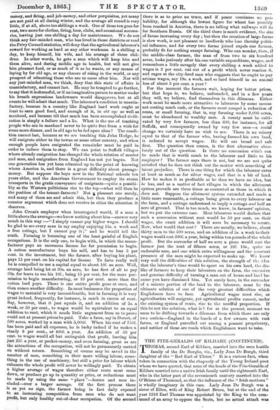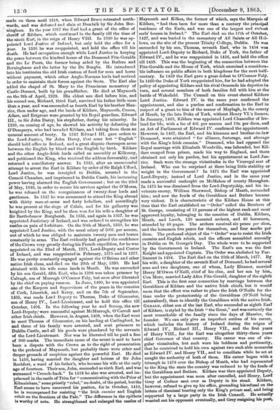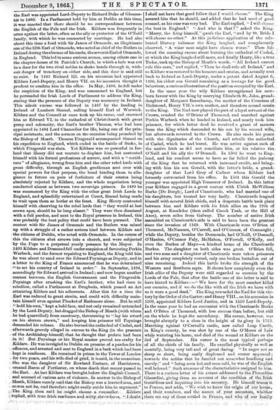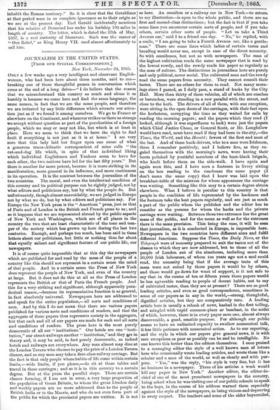THE FITZ-GERALDS OF KILDARE (CONTINUED). rpHomAs, second Earl of Kildare,
married into the once hostile 1 family of the De Burghs, viz., Lady Jean De Burgh, third daughter of the "Red Earl of Ulster." It is a curious fact, when taken in connection with the rhapsody of the Young Ireland poet whom we have quoted, that none of the heads of the Fitz-Geralds of Kildare married into a native Irish family until the eighteenth Earl, who in the latter part of the seventeenth century married into the O'Briens of Thomond, so that the influence of the "Irish mothers" is wholly imaginary in this case. Lady Jean De Burgh was a sister of Ellen, wife of King Robert Bruce, but at the end of the year 1316 Earl Thomas was appointed by the King to the com- mand of an army to oppose the Scots, but no actual attack was
made on them until 1318, when Edward Brace retreated north- wards, and was defeated and slain at Dundalk by Sir John Ber- ningham. In the year 1317 the Earl had a grant of the office of sheriff of Kildare, which continued in the family till the time of the ninth Earl, in the reign of Henry VIII. In 1320 he was ap- pointed Lord Justice of Ireland, but only held the office for a year. In 1326 he was reappointed, and held the office till his death. He had occupation enough while Lord Justice in keeping the peace between the kindred house of the Desmond Fitz-Geralds and the Le Poers, the former being aided by the Butlers and Berninghams and the latter by the De Burghs. He introduced into his territories the old Irish custom of food for man and horse without payment, which other Anglo-Norman lords had revived in order to maintain their forces against the Scots. The Earl also added the chapel of St. Mary to the Franciscan monastery of Castle-Dermot, built by his grandfather. He died at Maynooth on the 9th of April, 1328. His eldest son died before him, and his second son, Richard, third Earl, survived his father little more than a year, and was succeeded as fourth Earl by his brother Mau- rice, then under age, and the lands of Kildare, Maynooth, Croom, Adare, and Estgrene were granted by his Royal guardian, Edward to Sir John Darcy, his stepfather, during his minority. In 1339, on coming of age, he showed his activity by defeating the O'Dempseys, who had invaded Kildare, and taking from them an unusual amount of booty. In 1342 Edward III. gave orders to the Lord Justic; Sir John Darcy, that none but " English " should hold office in Ireland, and a great dispute thereupon arose between the English by blood and the English by birth. Kildare and the other Anglo-Irish lords called an assembly at Kilkenny, and petitioned the King, who received the address favourably, and returned a conciliatory answer. In 1345, after an unsuccessful attempt to arrest the Earl in Kildare by order of Sir Ralph Ufford, Lord Justice, he was inveigled to Dublin, arrested in the Council Chamber, and imprisoned in Dublin Castle, his increasing power having alarmed the English Government ; but on the 23rd of May, 1346, in order to secure his services against the O'Mores, he was released on the recog,nizances of twenty-four lords and gentlemen. In 1347 he was summoned to attend the King abroad with thirty men-at-arms and forty hobellers, and accordingly he was present at the siege of Calais, and for his gallantry was knighted by the King, and he then won for his wife a daughter of Sir Bartholomew Burghersh. In 1356, and again in 1357, he was appointed Justiciary of Ireland, and was ordered to strengthen his castles on pain of forfeiture. On the 30th of March, 1360, he was appointed Lord Justice, with the usual salary of 500/. per annum, out of which he was obliged to maintain twenty men and horses constantly in arms. The Earl evidently had gained the confidence of the Crown very greatly during his French expedition, for he was appointed on the 22nd of March, 1371, Lord-Deputy and Custos of Ireland, and was reappointed in February, 1375 and in 1377. He was pretty constantly engaged against the O'Briens and other native Irish clans, and died on the 29th of May, 1390. He had obtained with his wife some lands in Meath. He was succeeded by his son Gerald, fifth Earl, who in 1398 was taken prisoner by Calvag,h, son of Murrogh O'Connor Faly, but soon after liberated by the chief on paying ransom. In June, 1400, he was appointed one of the Keepers and Supervisors of the peace in the counties of Cork, Limerick, and Kerry, and on the 7th of September, 1405, was made Lord Deputy to Thomas, Duke of Gloucester, son of Henry IV., Lord-Lieutenant, and he held this office till October, 1406. In the following year he and Scroop, the new Lord-Deputy,twere successful against McMurrogh, O'Carroll and other Irish chiefs. However, in August, 1408, when the Earl went to meet Thomas of Gloucester, on his landing at Carlingford, he and three of his family were arrested, and sent prisoners to Dublin Castle, and all his goods were plundered by the servants of the Lord-Lieutenant. Nor was he liberated till he paid a fine of 300 marks. The immediate cause of the arrest is said to have been a dispute with the Crown as to the right of presentation to the prebend of Maynooth, but probably there were other and deeper grounds of suspicion against the powerful Earl. He died in 1410, having married the daughter and heiress of Sir John Rochfort, a ward of his father's, who became his wife at the early age of fourteen. Their son, John, succeeded as sixth Earl, and was surnamed "Crouch-back." In 1418 he also was arrested, and im- prisoned in the castle of Trim for "communicating with the Prior of Kilmainham," some priestly "rebel," no doubt, of the period, but the Earl seems to have recovered his positon, for in October, 1410,
he is recompensed for resisting "the Irish enemies and English rebels on the frontiers of the Pale." The difference in the epithets
is worthy of note. He strengthened and enlarged the castles of
Maynooth and Kilkea, the former of which, says the Marquis of Kildare, "had then been for more than a century the principal residence of the Earls, and was one of the largest and richest earls' houses in Ireland." The Earl died on the 17th of October, 1427, and was buried in the monastery of All Saints or All Hal- lows, on the site of the present Trinity College, Dublin. He was succeeded by his son, Thomas, seventh Earl, who in 1454 was appointed Lord-Deputy to Richard, Duke of York, the father of Edward IV., and he was reappointed in 1456, and held the office till 1459. This was the beginning of the connection between the Fitz-Geralds and the House of York, which exercised a considera- ble influence on public affairs in both kingdoms for the next half- century. In 1459 the Earl gave a great defeat to O'Connor Faly. In 1460 the Duke of York reappointed him, for he had adopted the policy of appointing Kildare and his rival °monde his deputies in turn, and several members of both families fell with him at the battle of Wakefield. The Council on this event elected Kildare Lord Justice. Edward IV. in the same year confirmed the appointment, and also a pardon and confirmation to the Earl in respect of a grant to him of the manor of Moylagh, in the county of Meath, by the late Duke of York, without Henry VI's licence. In January, 1463, Kildare was appointed Lord Chancellor of Ire- land for life, with a fee of 40/. per annum and 10s. per diem, and an Act of Parliament of Edward IV. confirmed the appointment. However, in 1467, the Earl, and his kinsman and brother-in-law Desmond, were attainted "for alliance, fosterage, and alterager with the King's Irish enemies." Desmond, who had opposed the Royal marriage with Elizabeth Woodville, was beheaded, but Kil- dare escaped from prison, made his way to England, and there obtained not only his pardon, but his appointment as Lord Jus- tice. Such were the strange vicissitudes in the Viceregal seat of Ireland. Who can be surprised at there being little stability or- weight in the Government ? In 1471 the Earl was appointed Lord-Deputy, instead of Lord Justice, and in the same year made a successful onslaught on McMahon of county Monaghan. In 1475 he was dismissed from the Lord-Deputyship, and his in- veterate enemy, William Sherwood, Bishop of Meath, succeeded him ; and now the feuds of the Geraldines and Butlers became very violent. It is characteristic of the Kildare House at this time that the Earl established an "Order" called the Brothers of' St. George, consisting of 13 persons of the highest rank and most approved loyalty, belonging to the counties of Dublin, Kildare, Meath, and Louth, 120 mounted archers, and 40 horsemen, attended by 40 pages. The archers received six pence per diem, and the horsemen five pence for themselves, and four marks per- diem. The professed object of the "Order" was to resist the Irish enemies and English rebels, and the officers assembled annually in Dublin on St. George's Day. The whole were to be supported by the Government in Ireland. The Earl's son was the first Knight and appointed Captain. The Order was abolished by Par- liament in 1494. The Earl died on the 25th of March, 1477. By his wife, a daughter of the seventh Earl of Desmond, he had severer sons and two daughters, one of whom, Lady Eleanor, married Henry 3.120wen O'Neill, chief of his clan, and her son by him, Con More, married Lady Alice Fitz-Gerald, daughter of the eighth Earl. This is the first near connection by marriage between the Geraldines of Kildare and the native Irish chiefs, but it would seem that the effect was rather to place the Irish O'Neills for the time under the protectorship of the Geraldines (O'Neill being naturalized), than to identify the Geraldines with the native Irish. GERALD, eldest son of the last Earl, who succeeded as eighth Earl of Kildare, is styled by the Irish "the Great," and was certainly the most remarkable of the family since the days of Maurice, the founder. We can only give an imperfect outline of his career, which includes the history of Ireland during the reigns of Edward IV., Richard HI., Henry VII., and the firat years of Henry VIII., for the Earl was altogether thirty-three years chief Governor of that country. His career was one of sin- gular vicissitudes, but such were his boldness and pertinacity, that he contrived to hold his own against two such able monarchs as Edward IV. and Henry VII., and to conciliate while be set at naught the authority of both of them. His career began with a triumph in 1478 over the Bishop of Meath, who had represented to the King the state the country was reduced to by the feuds of the Geraldines and Butlers. Kildare was then appointed Deputy„ but the appointment was soon after cancelled, and Henry, Lord Grey of Codnor sent over as Deputy in his stead. Kildare, however, refused to give up his office, grounding his refusal on the letters of dismissal bearing only the King's private seal, and being- supported by a large party in the Irish Council. He actually wearied out his opponent eventually, and Grey resigning his post, the Earl was appointed Lord-Deputy to Richard Duke of Glouces- ter in 1480. In a Parliament held by him at Dublin at this time, it was enacted that there should be no correspondence between the English of the Pale and the Irish. Kildare was frequently in stens against the latter, often as the ally or protector of the O'Neill family, with which he-was connected by marriage. He had also about this time a feud with Sir James of Ormonde, an illegitimate sass-of the fifth Earl of Ormonde, who acted ea chief of the Butlers in Ireland during theabsence of his uncle, the seventh Earlof Ormonde, in England. This led to some curious seenes,-amolig others one in the chapter-house of St Patriek's Church, in which a hide was cut in a door for the two rival nobles to shake heeds through it, with- out danger of treachery on 'either side, and this door is said still to exist. In 1483 Richard HI. on his accession bad appointed Kildare Lord-Deputy, and Henry VII. on kislaeeession thought it prudent to confirm him in the office. In May,-I486, he fell under the suspicion of the King, and was summoned to England, but he persuaded the Irish Lords of Parliament to address4he King, stating that the presence of the Deputy was necessary in Ireland. This adroit excuse was followed in 1487 by the landing in Ireland of Lambert Simnel, calling himself Earl of Warwick. Kildare and the Council at once took up his cause, and crowned him as Edward VI. in the cathedral of Christchurch with great pomp and solemnity, the Earl's brother Thomas, who had been appointed in-1484 Lord Chancellor for life,- being one of the prin- cipal assistants, and the sermon on the occasion being preached by the Bishop of Meath. Thomas Fitzgerald accompanied Simnel on his expedition to England, which ended in the battle of Stoke, in which Fitzgerald was slain. Yet Kildare was so powerful in Ire- land that Henry did not venture to displace him, but contented himself with his formal professions of sorrow, and with a " certifi- cate " of-allegiance, wrung from him and the other rebel lords with great difficulty, through an English gentleman sent over with special powers for that purpose, the bond binding them to alle- giance in future on pain of , forfeiture of their estates being absolutely rejected by Kildare, and the whole negotiation being conducted almost as between two sovereign princes. In 1489 he was summoned- by the King with the other great Irish Lords to England, and splendidly entertained at Court, Simnel being made to wait upon them as butler at the feast. King Henry contented himself with observing to the rebel lords that "they would at last crown apes, should he be long absent." They were then dismissed with a full pardon, and next to the Royal presence in Ireland, this was probably the. best policy that could have been pursued. The contest with Sir James of Ormonde and the Butlers was mixed up with a struggle of a rather serious kind between Kildare and the citizens of Dublin, who acted with Ormonde. In the course of this the citizens shot arrows into a church, and were subjected by the Pope to a perpetual yearly penance by the Mayor. In 1493 Kildare and Desmondfell under suspicion of favouring Perkin 1Varbeck, and the former repairing to England, the King told him he was about to send over Sir Edward Poyning,s as Depaty, and in a letter to the King of France announced that he was determined "to set his country of Ireland in order." In September, 1494, accordingly Sir Edward arrived in Ireland ; and-now began another contest between. the English Government and the Fitzgeralds. Poynings after crushing the Earl's brother, who had risen in rebellion, called a Parliament at Drogheda, which passed an Act attainting Kildare sad his adherents. After this for a time the Earl was reduced to great straits, and could with difficulty main- tain himself even against Plunket of Rathmore alone. But he still "held his own," kept a bold face, and not only remained untouched by the Lord-Deputy, but dragged the Bishop of Meath (with whom he had quarrelled) from sanctuary, threatening to "lay his sword on his shaven crown," and keeping him prisoner till Poynings demanded his release. He also burned the cathedral of Cashel, and afterwards gravely alleged in excuse to the King (in the presence of the Archbishop himself) that he thought that prelate had been in it! But Poyniags or his Royal master proved too crafty for Kildare. He was inveigled to Dublin on promise of a pardon for his offences, and arrested and sent to England in a bark which had been kept in readiness. He remained in prisen in the Tower of London for two years, and his wifeodied of grief, it is said, in the meantime. She was the daughter of- Sir Rowland Eustace, of Harristown, created Baron of Portle,ster, on whose death that manor. passed to the Earl. At last Kildare was braught before the English Council, and accueed of various sets ef violence. ,In answer to the Bishop of Meath, Kildare merely said that the Bishop was a learned wan, and so was not he, and therefore might easily outdo him in argument." The King then said he ,might, chow- a counsellor. Kildare replied, with true Irish readinenagAndAvitty shrewdness, " I doubt
I shall not have that good fellow that I would choose." The King_
assured him that he should, and added that he had need of good counsel, as his case was very bad. The Earl replied, "I will choose the best in England." "And who is that? r asked the King. "Marry, the King himself," quoth the Earl, "and by St. Bride I will ehoose no other." At this judicious applieation of the cele- brated Blarney talisman the King laughed, and complacently observed, "A wiser man might have chosen worse.". Then fol- lowed the amusing excuse about burning the cathedral of Cashel, at which the King laughed still more, and finally Henry, like a true Tudor, took up the Bishop of Meath's words, "All Ireland cannot rule this man," and replied, "Then be shall rule all Ireland," and BO Kildare was restored to his honours and estates, and actually sent back to Ireland as Lord-Deputy, under a patent dated August 6, 14116, his eldest son Gerald remaining as a- hostage for his good, behaviour, a curious illustration of the position-occupied by the Earl.
In the same year the wily Kildare strengthened -his- new- < born favour with the King by marrying Elizabeth St. John, grand-. daughter of Margaret Beauchamp, the mother of the Countess of Richmond, Henry VII.'s own mother, and therefore second cousin to the King. The-Earl now played the part of a loyal servant of the Crown, crushed the O'Briens of Thomond, and marched against Perkin Warbeck when he lauded in Ireland, and nearly took him prisoner, for which latter deed he received a grant of manors from the King which descended to his son by his second wife, but afterwards reverted to the Crown. He also made his peace with the dignitaries of the Church, and rebuilt the cathedral of Cashel, which he had burnt. He was active against such of the native Irish as did not conciliate him, or his relative the O'Neill and his ally the O'Donnell. In 1503 he < went to Eng- land, and his conduct seems to have so far lulled the jealousy of the King that he returned with increased credit, and bring- ing with him his son Gerald, with the latter's bride, a grand- daughter of that Lord Grey of Codnor whom Kildare had formerly outwearied from his office. In 1504 this Gerald the . younger was appointed High Treasurer of Ireland. In this latter year Kildare engaged in a great contest with Ulrick McWillian3. Burke [De Burgh], Lord of Clanricarde, who had married one of his daughters, but treated her very badly. Clanricarde leagued himself with several Irish chiefs, and a desperate battle took place between him and Kildare with his Irish allies on the 19th of August, at Knockdoe (then called Cnock Tuah, or the Hill of Axes), seven miles from Galway. The number of native Irish assembled on Clanricarde's side is said to have been the greatest since the invasion of 1169. With Clanricarde were O'Brien of Thomond, McNamara, O'Carroll, and O'Connor, of Connaught ; while the Deputy, besides the Deamonds, had O'Neill, O'Donnell, O'Hanlon, O'Connor Faly, McMahon, • °Terrell, O'Kelly, and even the Burkes of Mayo—a kindred house of the Clanricarde Burkes. The slaughter on both sides was great. O'Brien fell, and two sons and a daughter of Clanricarde were taken prisoners and his army completely routed, only one broken battalion out of nine remaining. Indeed this battle broke the strength of the Western and Southern septs. It shows how completely even the Irish allies of the Deputy were still regarded as enemies by the Lords of the Pale, that after, the battle ene of the latter is said to have hinted to Kildare :—" We have for the most number killed our enemies, and if we do the like with all the Irish we have with us it were a good deed." The King rewarded the Earl for this vie- torybythe Order of the Garter ; and Henry VIII„ on his accession in 1509, appointed Kildare Lord Justice, and in 1510 Lord-Deputy. In the same year he had an encounter with the Clanricarde Burke and O'Brien of Thomond, with less success than before, but still on the whole he kept the ascendency. His career, however, was brought abruptly to a close in the height of its glory in 1513. Marching against O'Carroll's castle, DOW called Leap Castle, in King's county, he was shot by one of the O'Mores of biz while watering his horse, and died of the wound at Kildare on the 3rd of September. His career, is the most typical perhaps of all the chiefs of his family. He excelled physically as well as mentally, being very tall and of great daring. "In anger not so sharp as short, being easily displeased and sooner appeased ; towards the nobles that he fancied not somewhat headlong and unruly;" and "being soon hot and soon cold, he was of the English well beloved." Such aresome of the characteristics assigned to him. There is a curious letter of his extant addressed to the Florentine Gheurclini, giving them an account of the condition of the Irish Geraldines-and- inquiring into his ancestry lie himself traces it to Franca, and adds., " We wish to know the origin of our house, and their numbers, and the names of your ancestors, whether there are any of them settled in France, and who of our family inhabit the Roman territory." So it is clear that the Geraldines at that period were in as complete ignorance as to their origin as we are at the present day. Earl Gerald incidentally mentions that his relative of Desmond has under his lordship 100 miles in length of country. The letter, which is dated the 27th of May, 1507, is a real curiosity of literature. Such was the career of "Our Rebel," as King Henry VII. used almost affectionately to call him.





































 Previous page
Previous page